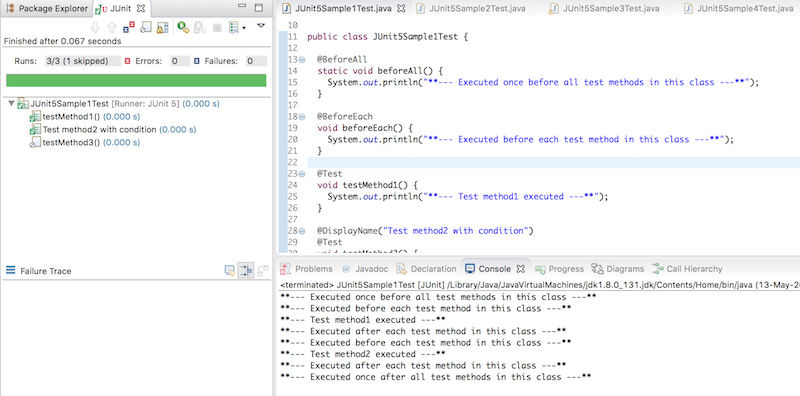JUnit5チュートリアル
JUnit5のチュートリアル
このJunitチュートリアルでは、Junit5の基本と新機能を例を使って紹介します。Javaの世界では、JunitはJavaコードに対してユニットテストを実装するためによく使われるフレームワークの一つです。Junitは主に開発者が自分自身でJVM上でコードをテストするのを助ける役割を果たしています。
JUnit5アーキテクチャ

JUnitプラットフォーム
- Launches testing frameworks on the JVM
- Has TestEngine API used to build a testing framework that runs on the JUnit platform
JUnit Jupiter を日本語で説明すると、以下のように言い換えることができます。
「JUnit Jupiter」とは、Javaのユニットテストフレームワークのひとつです。
- Blend of new programming model for writing tests and extension model for extensions
- Addition of new annotations like @BeforeEach, @AfterEach, @AfterAll, @BeforeAll etc.
JUnit ビンテージ
- Provides support to execute previous JUnit version 3 and 4 tests on this new platform
JUnitのMavenの依存関係
JUnit5ベースのテストケースをプロジェクトに実装するためには、プロジェクトのpom.xmlファイルに以下の依存関係を追加してください。
- JUnit 5 Library
<dependency>
<groupId>org.junit.jupiter</groupId>
<artifactId>junit-jupiter-engine</artifactId>
<version>5.1.1</version>
<scope>test</scope>
</dependency>
<dependency>
<groupId>org.junit.platform</groupId>
<artifactId>junit-platform-runner</artifactId>
<version> 1.1.1</version>
<scope>test</scope>
</dependency>
- JUnit5 maven surefire provider to execute the unit tests where IDE does not have JUnit5 support (if IDE has support then this point is not required)
<plugin>
<artifactId>maven-surefire-plugin</artifactId>
<version>2.19.1</version>
<dependencies>
<dependency>
<groupId>org.junit.platform</groupId>
<artifactId>junit-platform-surefire-provider</artifactId>
<version>1.0.2</version>
</dependency>
</dependencies>
</plugin>
JUnit5の新機能
実行時にはJava 8以上が必要ですが、以前のJavaバージョンでコンパイルされたコードをテストすることもできます。さまざまな新機能が導入されました。
JUnitのアノテーション
以下には、いくつかの一般的に使用される注釈が提供されています。 (Ika ni wa, ikutsu ka no ippan-teki ni shiyou sareru chūkai ga teikyō sa reteimasu.)
| Annotation | Description |
|---|---|
| @Test | Denotes a test method |
| @DisplayName | Declares a custom display name for the test class or test method |
| @BeforeEach | Denotes that the annotated method should be executed before each test method |
| @AfterEach | Denotes that the annotated method should be executed after each test method |
| @BeforeAll | Denotes that the annotated method should be executed before all test methods |
| @AfterAll | Denotes that the annotated method should be executed after all test methods |
| @Disable | Used to disable a test class or test method |
| @Nested | Denotes that the annotated class is a nested, non-static test class |
| @Tag | Declare tags for filtering tests |
| @ExtendWith | Register custom extensions |
package com.scdev;
import org.junit.jupiter.api.AfterAll;
import org.junit.jupiter.api.AfterEach;
import org.junit.jupiter.api.BeforeAll;
import org.junit.jupiter.api.BeforeEach;
import org.junit.jupiter.api.Disabled;
import org.junit.jupiter.api.DisplayName;
import org.junit.jupiter.api.Test;
public class JUnit5Sample1Test {
@BeforeAll
static void beforeAll() {
System.out.println("**--- Executed once before all test methods in this class ---**");
}
@BeforeEach
void beforeEach() {
System.out.println("**--- Executed before each test method in this class ---**");
}
@Test
void testMethod1() {
System.out.println("**--- Test method1 executed ---**");
}
@DisplayName("Test method2 with condition")
@Test
void testMethod2() {
System.out.println("**--- Test method2 executed ---**");
}
@Test
@Disabled("implementation pending")
void testMethod3() {
System.out.println("**--- Test method3 executed ---**");
}
@AfterEach
void afterEach() {
System.out.println("**--- Executed after each test method in this class ---**");
}
@AfterAll
static void afterAll() {
System.out.println("**--- Executed once after all test methods in this class ---**");
}
}

JUnitのアサーション
すべてのテストメソッドは、アサーションを使用して条件が真であることを評価する必要があります。これにより、テストが続行されます。JUnit Jupiter のアサーションは、org.junit.jupiter.api.Assertions クラスに保持されています。すべてのメソッドは静的です。
| Assertion | Description |
|---|---|
| assertEquals(expected, actual) | Fails when expected does not equal actual |
| assertFalse(expression) | Fails when expression is not false |
| assertNull(actual) | Fails when actual is not null |
| assertNotNull(actual) | Fails when actual is null |
| assertAll() | Group many assertions and every assertion is executed even if one or more of them fails |
| assertTrue(expression) | Fails if expression is not true |
| assertThrows() | Class to be tested is expected to throw an exception |
@Test
void testAssertEqual() {
assertEquals("ABC", "ABC");
assertEquals(20, 20, "optional assertion message");
assertEquals(2 + 2, 4);
}
@Test
void testAssertFalse() {
assertFalse("FirstName".length() == 10);
assertFalse(10 > 20, "assertion message");
}
@Test
void testAssertNull() {
String str1 = null;
String str2 = "abc";
assertNull(str1);
assertNotNull(str2);
}
@Test
void testAssertAll() {
String str1 = "abc";
String str2 = "pqr";
String str3 = "xyz";
assertAll("numbers",
() -> assertEquals(str1,"abc"),
() -> assertEquals(str2,"pqr"),
() -> assertEquals(str3,"xyz")
);
//uncomment below code and understand each assert execution
/*assertAll("numbers",
() -> assertEquals(str1,"abc"),
() -> assertEquals(str2,"pqr1"),
() -> assertEquals(str3,"xyz1")
);*/
}
@Test
void testAssertTrue() {
assertTrue("FirstName".startsWith("F"));
assertTrue(10 {
throw new IllegalArgumentException("Illegal Argument Exception occured");
});
assertEquals("Illegal Argument Exception occured", exception.getMessage());
}
JUnit5のインポート文
テストクラスはorg.junit.jupiter.api.Testのインポート文を必要とし、org.junit.Testではありません。また、テストメソッドはpublicである必要はありませんし、ローカルなパッケージ内である必要もありません。
import org.junit.jupiter.api.Test;
JUnit5の前提条件
前提条件は、org.junit.jupiter.api.Assumptionsクラスの静的メソッドです。指定された条件が満たされていない場合は、テストは実行されません。中止されたテストはビルドの失敗を引き起こしません。前提条件が失敗すると、org.opentest4j.TestAbortedExceptionがスローされ、テストはスキップされます。
| Assumptions | Description |
|---|---|
| assumeTrue | Execute the body of lamda when the positive condition hold else test will be skipped |
| assumeFalse | Execute the body of lamda when the negative condition hold else test will be skipped |
| assumingThat | Portion of the test method will execute if an assumption holds true and everything after the lambda will execute irrespective of the assumption in assumingThat() holds |
@Test
void testAssumeTrue() {
boolean b = 'A' == 'A';
assumeTrue(b);
assertEquals("Hello", "Hello");
}
@Test
@DisplayName("test executes only on Saturday")
public void testAssumeTrueSaturday() {
LocalDateTime dt = LocalDateTime.now();
assumeTrue(dt.getDayOfWeek().getValue() == 6);
System.out.println("further code will execute only if above assumption holds true");
}
@Test
void testAssumeFalse() {
boolean b = 'A' != 'A';
assumeFalse(b);
assertEquals("Hello", "Hello");
}
@Test
void testAssumeFalseEnvProp() {
System.setProperty("env", "prod");
assumeFalse("dev".equals(System.getProperty("env")));
System.out.println("further code will execute only if above assumption hold");
}
@Test
void testAssumingThat() {
System.setProperty("env", "test");
assumingThat("test".equals(System.getProperty("env")),
() -> {
assertEquals(10, 10);
System.out.println("perform below assertions only on the test env");
});
assertEquals(20, 20);
System.out.println("perform below assertions on all env");
}
JUnit のネストしたテストクラス
ネストされたテストは、ネストされたクラスを作成し、そのすべてのテストメソッドを実行することができます。内部クラスは、非静的である必要があります。単に内部クラスに@Nestedのアノテーションを付ければ、内部にあるすべてのテストメソッドが実行されます。
@BeforeAll
static void beforeAll() {
System.out.println("**--- JUnit5Sample4Test :: beforeAll :: Executed once before all test methods ---**");
}
@BeforeEach
void beforeEach() {
System.out.println("**--- JUnit5Sample4Test :: beforeEach :: Executed before each test method ---**");
}
@AfterEach
void afterEach() {
System.out.println("**--- JUnit5Sample4Test :: afterEach :: Executed after each test method ---**");
}
@AfterAll
static void afterAll() {
System.out.println("**--- JUnit5Sample4Test :: afterAll :: Executed after all test method ---**");
}
@Nested
class InnerClass {
@BeforeEach
void beforeEach() {
System.out.println("**--- InnerClass :: beforeEach :: Executed before each test method ---**");
}
@AfterEach
void afterEach() {
System.out.println("**--- InnerClass :: afterEach :: Executed after each test method ---**");
}
@Test
void testMethod1() {
System.out.println("**--- InnerClass :: testMethod1 :: Executed test method1 ---**");
}
@Nested
class InnerMostClass {
@BeforeEach
void beforeEach() {
System.out.println("**--- InnerMostClass :: beforeEach :: Executed before each test method ---**");
}
@AfterEach
void afterEach() {
System.out.println("**--- InnerMostClass :: afterEach :: Executed after each test method ---**");
}
@Test
void testMethod2() {
System.out.println("**--- InnerMostClass :: testMethod2 :: Executed test method2 ---**");
}
}
}
JUnitテスト例外
特定の条件の下で例外をスローすることが期待される場面があります。指定された例外を投げない場合、assertThrowsはテストに失敗します。
Throwable exception = assertThrows(IllegalArgumentException.class, () -> {
throw new IllegalArgumentException("Illegal Argument Exception occured");
});
assertEquals("Illegal Argument Exception occured", exception.getMessage());
JUnit テストの実行
ユニットテストは様々な方法で実行できますが、以下の2つの方法があります:
- Use Eclipse IDE Oxygen.3a (4.7.3a) Release and open test file to be executed. Right-click on the file and choose option Runs As followed by JUnit Test
- Use mvn test command on Windows command prompt
要約すると、以下のようになります。
私たちは、いくつかの例を使ってJUnit5とその新機能を探索しました。また、JUnitの注釈、アサーション、前提条件、例外をどのように使用し、ネストされたテストクラスを書くことができるかも見てみました。
当社のGitHubリポジトリから、完全なサンプルプロジェクトをダウンロードすることができます。

